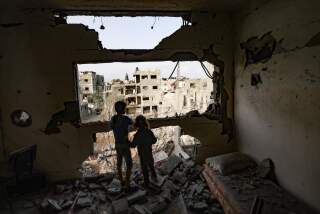Father Still Defends Sept. 11 Ringleader
- Share via
CAIRO, Egypt — Mohamed al Amir Atta no longer practices law, but when it comes to his son, he can still put up a spirited defense -- loud, long arguments that allow few interruptions and carefully evade the key questions: Was his son really the lead hijacker in the Sept. 11, 2001, attacks? How does he live with the knowledge? Does he still believe his son is alive?
The answers given by the snowy-haired, 68-year-old Egyptian in his apartment near the pyramids echo the anguish, defiance and inherent contradictions that have typified many Arab responses in the three years since the planes crashed into the twin towers and the Pentagon.
First, the denial: The attacks weren’t the work of Muslim fanatics. “Look to Mossad,” Israeli intelligence. Next, the rationalization: “No nation has done as much evil in the world as America did, and you do not expect God to punish it?” And then the defiance: “If a Palestinian flies a plane and strikes the White House and kills Bush, his wife and his daughters, he will go to heaven. So will any Muslim who defends his faith.”
There have always been Arab commentators urging their people to look inward for answers rather than place all the blame on the United States. After the bloodbath in the Russian school seized by Chechen attackers, such thinking has grown more noticeable. “Our terrorist sons are an end-product of our corrupted culture,” Abdul Rahman Rashed, general manager of Al Arabiya television, wrote in a newspaper column after the massacre in Russia.
But the urge to blame outsiders remains strong, as evidenced by the paperbacks sold on Cairo’s streets that explore the latest conspiracy theories, and which Atta cites as proof of Mossad involvement.
When Mohamed Atta was first identified as one of the 19 hijackers of Sept. 11, his father flatly denied it, even claiming his son had phoned him from an undisclosed location the day after the attack.
Journalists and investigators who flocked to his apartment found a distraught and angry man who asked for thousands of dollars for an interview, enough to discourage most inquiries.
The father agreed to an Associated Press interview -- free of charge -- in the days before the third anniversary of the attacks.
He still refuses to give direct answers to questions about his son. The likeliest sign of an acceptance of death is the son’s photo on the living-room wall. Mohamed Atta looks younger than the 33-year-old in the passport photo the world has come to know, but he has the same melancholy look. Next to the photo are framed inscriptions -- “Glory to God,” “By God’s Grace.”
But if they are an expression of mourning, as is often the purpose of such displays in Egypt, the father won’t acknowledge it. “Sons are dear,” is all he’ll say when pressed.
Like his son, Atta was born in the Nile Delta to a family that had immigrated from Saudi Arabia in the 17th century. He lives alone, apparently estranged from his second wife and their two daughters. Years ago, he divorced his first wife, the mother of Mohamed. She has avoided attention since 9/11. He still works as a consultant in the commercial cases in which he has specialized for 47 years. He keeps an office but rarely visits it. He has no assistants or partners.
Atta said Saturday’s anniversary would be an ordinary day for him -- “If I am still alive I will pray and read the Koran like every day. It is not something special for me.”
Despite his stated piety, he smokes and has statues of Buddha in his apartment -- things most devout Muslims would reject. But where his son is concerned, larger mysteries and apparent contradictions emerge.
Egyptian security officials, who keep close tabs on extremists because of this country’s own experience with terrorism, have questioned Atta but apparently gleaned little. They said FBI officials also interviewed him.
“The FBI and the CIA came to see me pretending to be journalists, but I discovered them and kicked them out,” he says.
An official who spent months researching the younger Atta’s life in Egypt said he remained an enigma.
The official, who spoke on condition of anonymity, said he discovered that while the son was studying engineering at Cairo University in the late 1980s, he was dating and drinking alcohol -- habits devout Muslims shun. The official said either the younger Atta was later brainwashed by Al Qaeda chief Osama bin Laden, or he pulled off an extraordinary deception.
Bin Laden described Atta in a videotape months after the attacks as being “in charge of the group” that attacked America.
Fleeing a crackdown on a bloody Islamic insurgency here in the 1980s and 1990s, many Egyptian militants took to the battlefields of Afghanistan, Chechnya, the Balkans and Kashmir. They are also believed to have played a big part in shaping Al Qaeda’s anti-American terrorist strategy. An Egyptian, Ayman Zawahri, became Bin Laden’s top deputy.
Atta was named by the FBI and in a Congressional report as the leader of the attacks and the suicide pilot of the first plane to crash into the World Trade Center.
U.S. officials have said they believe Atta met Bin Laden in Afghanistan in late 1999 at one of Bin Laden’s training camps.
Atta’s father would say only that he reared his boy to be a good Muslim.
“Muslims should not accept injustice and half-solutions,” he said. “Islam says, ‘Fight those who fight you.’ ”
More to Read
Sign up for Essential California
The most important California stories and recommendations in your inbox every morning.
You may occasionally receive promotional content from the Los Angeles Times.












